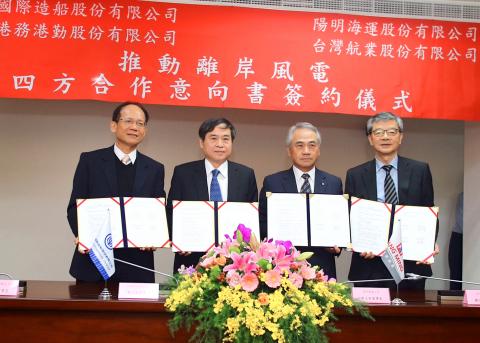CSBC Corp, Taiwan (台灣國際造船) yesterday unveiled an alliance to tap into demand — valued at about NT$30 billion (US$974.6 million) annually — for marine services from Taiwan’s emerging offshore wind energy sector.
The nation’s only listed shipbuilder said it inked a memorandum of understanding with Yang Ming Marine Transport Corp (陽明海運), Taiwan Navigation Co Ltd (台航) and state-run Taiwan International Port Corp (TIPC, 台灣港務) to combine the capabilities of Taiwan’s leading shipping and marine engineering companies.
The companies aim to lend their expertise to provide towing and transport for components and materials used to build offshore wind turbines, as well as maintenance services for construction vessels, before tackling advanced vessel repairs, search and rescue operations, and personnel training, CSBC chairman Cheng Wen-lon (鄭文隆) told a news conference.

Photo: Yang Ya-min, Taipei Times
Yang Ming Marine said it would train crew to transport oversized components on long-haul voyages, while Taiwan Navigation would provide experience in towing and dockside operations.
TIPC said that it has fleets of specialized vessels to perform surveying, towing, lifting and maintenance duties at commercial ports in Taiwan, and is to take delivery of two 6,400 horsepower towing vessels to meet demands for offshore wind projects.
TIPC would provide 47 vessels of various types and 409 crew, it said.
The companies said that a separate joint venture might be formed as they accumulate experience and build revenue streams through partnerships with foreign developers.
Meanwhile, CSBC reported a net loss of NT$2.29 billion for last year, narrowing from a loss of NT$3.04 billion in 2017, as the company continues to face pressure from a downturn in the global cargo shipping sector.
Revenue dipped 20.7 percent annually to NT$13.01 billion, it said.
While demand for new cargo vessels has remained in a slump, CSBC said that it has been diversifying into offshore wind projects and military contracts.
Shipbuilding still accounted for 90 percent of CSBC’s revenue last year, it said.
CSBC said it hopes to have its topline support evenly split between commercial and military shipbuilding, and offshore wind power projects.

Application-specific integrated circuit designer Faraday Technology Corp (智原) yesterday said that although revenue this quarter would decline 30 percent from last quarter, it retained its full-year forecast of revenue growth of 100 percent. The company attributed the quarterly drop to a slowdown in customers’ production of chips using Faraday’s advanced packaging technology. The company is still confident about its revenue growth this year, given its strong “design-win” — or the projects it won to help customers design their chips, Faraday president Steve Wang (王國雍) told an online earnings conference. “The design-win this year is better than we expected. We believe we will win

Intel Corp chief executive officer Lip-Bu Tan (陳立武) is expected to meet with Taiwanese suppliers next month in conjunction with the opening of the Computex Taipei trade show, supply chain sources said on Monday. The visit, the first for Tan to Taiwan since assuming his new post last month, would be aimed at enhancing Intel’s ties with suppliers in Taiwan as he attempts to help turn around the struggling US chipmaker, the sources said. Tan is to hold a banquet to celebrate Intel’s 40-year presence in Taiwan before Computex opens on May 20 and invite dozens of Taiwanese suppliers to exchange views

Chizuko Kimura has become the first female sushi chef in the world to win a Michelin star, fulfilling a promise she made to her dying husband to continue his legacy. The 54-year-old Japanese chef regained the Michelin star her late husband, Shunei Kimura, won three years ago for their Sushi Shunei restaurant in Paris. For Shunei Kimura, the star was a dream come true. However, the joy was short-lived. He died from cancer just three months later in June 2022. He was 65. The following year, the restaurant in the heart of Montmartre lost its star rating. Chizuko Kimura insisted that the new star is still down

While China’s leaders use their economic and political might to fight US President Donald Trump’s trade war “to the end,” its army of social media soldiers are embarking on a more humorous campaign online. Trump’s tariff blitz has seen Washington and Beijing impose eye-watering duties on imports from the other, fanning a standoff between the economic superpowers that has sparked global recession fears and sent markets into a tailspin. Trump says his policy is a response to years of being “ripped off” by other countries and aims to bring manufacturing to the US, forcing companies to employ US workers. However, China’s online warriors